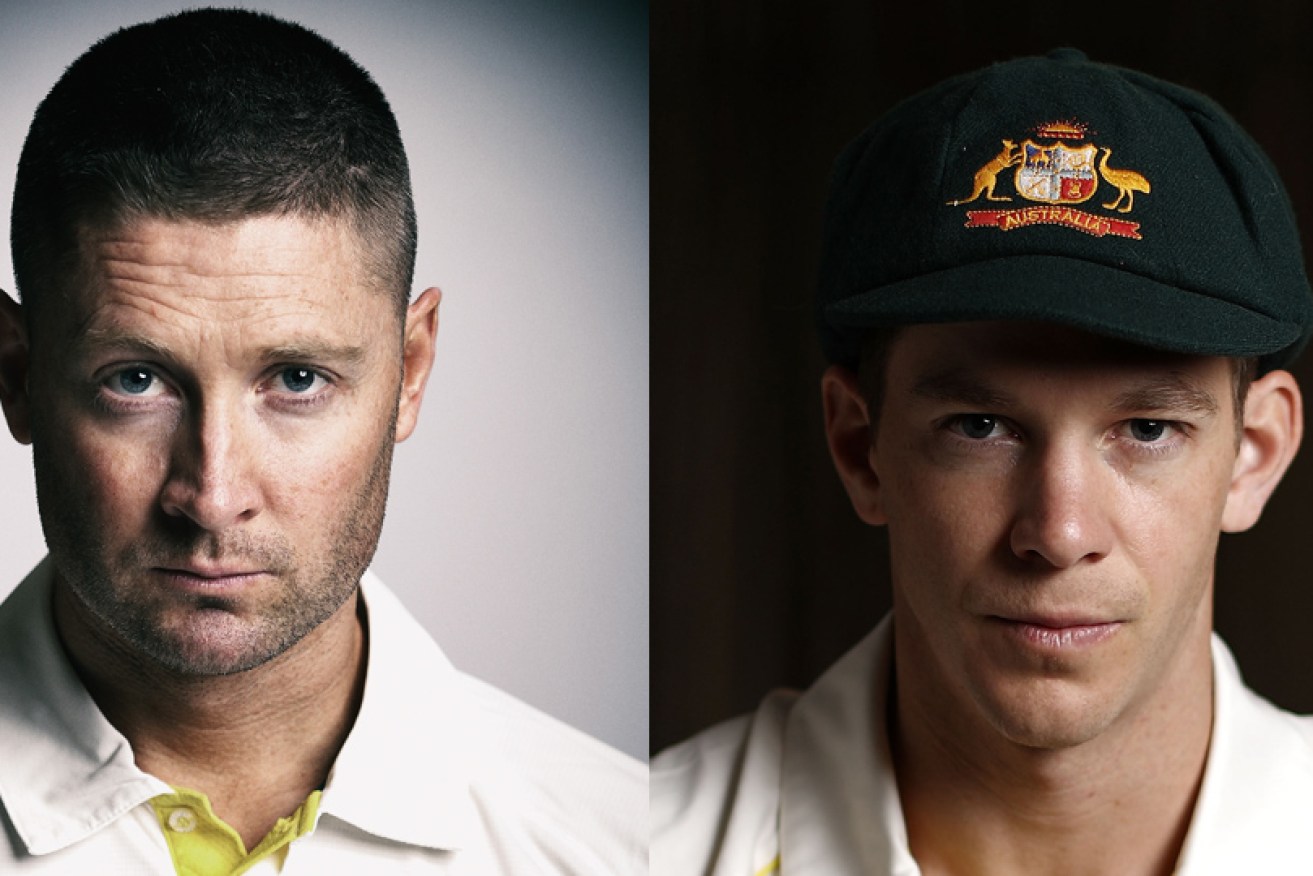Why Michael Clarke’s advice shows he was not the captain Australian cricket needed


Michael Clarke and Tim Paine – different visions of leadership. Photos: Getty
“We are in hell right now, gentlemen. We can either stay here and get the s–t kicked out of us or we can fight our way back … into the light.”
Al Pacino’s speech in the movie Any Given Sunday sums up the Australian cricket team perfectly.
While we all hope they’ll fight back, we also hope Cricket Australia (CA) has recognised the two enormous blunders that helped caused this mess in the first place and vows never to repeat them.
Former Australian captain Michael Clarke’s claim that “we’re not going to win s–t” unless we ditch the nice-guy routine and get back to pitbull aggression on the cricket field highlights the fundamental weakness that has corroded Australian cricket – leadership.
CA had a policy of choosing our best player, then hoping they would know how to lead.
In both Clarke and Steve Smith’s cases, they were undoubtedly the most talented players, but were they the best leaders?
The obvious answer is no. I don’t blame these men, I blame the men who selected them.
With leadership, you get what you settle for. From the outside it was obvious unseemly incidents and issues were going unaddressed.
Failure to address poor behaviour means you condone it. It was only a matter of time before it all exploded like it did that day in South Africa.
The responsibility for the decline in the team’s performance and on-field behaviour is partly a product of the prevailing culture created by CA bosses, however, the vast majority must be worn by the skippers.
The setting and upholding of standards, game by game, innings by innings, moment by moment, is a captain’s job.
And while Clarke and Smith achieved some great results and were great batsmen, they failed as leaders.
Neither has been helped by a fundamental shift in the way the Australian team is selected and prepared for the rigours of international cricket.
At one time the phrase “It’s harder to get out of the Australian cricket team than to get into it” rang true. Selectors showed enormous faith in the incumbent players, we gave them time, and they repaid us in spades.

Michael Clarke’s old-school attitude is not the answer. Photo: Getty
Those not in the squad had to bide their time; honing their craft, maturing, ensuring they were ready if and when the call came.
Players like Matthew Hayden and Mike Hussey (15,000-plus first-class runs before debuting) spent countless years dominating Sheffield Shield cricket before getting their breaks.
This policy built up a bank of highly capable replacements, ready to step in at a moment’s notice. It was one soldier down, another soldier in.
Then in a case of sports science overruling common sense, we changed plans. We became paranoid that players would tire or heaven forbid, get injured.
Players in the prime of their careers, bowling and batting for Australia, were told to rest, to return to Shield cricket or not play at all.
Training time was restricted to a certain number of balls bowled or net minutes restricted.
Insiders will tell you that no player thought this was a great idea. In short, we became soft. CA broke the age-old truism of sport – never flirt with your form.
And this is what we did. We flirted with our form by choosing players not yet ready to play at international level. The integrity of selection and merit-based selection went out the window. This created uncertainty and resentment throughout cricket and no team or player thrives in these circumstances.
It breeds selfishness.
EXCLUSIVE: Fresh footage of David Warner reacting ferociously to a taunt by Quinton de Kock. pic.twitter.com/l5Cp5Qz94U
— ESPNcricinfo (@ESPNcricinfo) March 7, 2018
The baggy green was no longer the prized possession of the elite, the most deserved.
The revolving door policy churned and burned through countless players, ruining reputations and careers. Since 2000, 21 cricketers have played three or fewer Test matches for Australia. Twelve of those have played only one Test.
Remember Dan Cullen, Beau Casson, Joe Mennie, Callum Ferguson, Chadd Sayers, Peter George or Graham Manou?
One man who knows how difficult it is to break into the Australian team is the Sheffield Shield’s second-leading all-time runscorer and games record holder, Jamie Cox.
Cox agrees the rotation policy was the beginning of the end for Australian Cricket.
In his role managing South Australian cricket he witnessed first hand the anger that rested players exhibited and how selections bewildered the players.
Cricketers are a competitive bunch, and the idea of never giving a sucker an even break is alive and well. Why would I, a fit player at the top of my game, hand my baggy green to another player?
Cox believes the one and only departure from merit-based selection is if we unearth a once-in-a-generation talent, like Ricky Ponting. This type of player needs to be elevated before time. However, he cautions, they are few and far between.
The fact that we are a week out from the first Test and the selection is far from finalised shows we have learned little. Choosing a man who upholds standards like Tim Paine to be captain is a smart move.
If we also return to the ‘pick and stick policy’ and build up a bank of ready-made Shield players, we may just, in the words of Pacino, climb back into the light.
Nathan Burke is a former St Kilda captain who played 323 AFL games for the Saints, winning three Trevor Barker Awards as best and fairest player and named an All-Australian four times.








